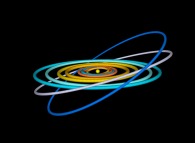![Click to download and possibly see the movie [Cliquez pour télécharger et voir éventuellement le film] Click to download and possibly see the movie [Cliquez pour télécharger et voir éventuellement le film]](image.jpg)
From Pluto to the Sun -extrapolation 2- (non linear scales) [De Pluton au Soleil -extrapolation 2- (échelles non linéaires)].
A virtual Earth-like planet (dark blue) is added to the actual Solar System;
Each frame of this animation corresponds to a particular trajectory of this planet
when moved from beyond Pluto -bottom left- to the Sun -top right- and 16.pi rotated (see figure "The journey of an Earth-like planet (dark blue) in the Solar System").
For each of these trajectories, the 11-body system is visualized
with the virtual planet at the origin of coordinates.
See some interesting Virtual planet points of view -on the right-hand side-
(with the related Heliocentric points of view -on the left-hand side-) from this interpolation:
 ==>
==> 
 ==>
==> 
 ==>
==> 
 ==>
==> 
See an artistic view:

See the same journey with a subset of the Solar System {Uranus, Neptune, Pluto, the virtual planet} -with linear scales and slightly different colors-:

The relative trajectories look non periodical and even chaotic.
It is worth noting that the same phenomenon can be observed
with with pure uniform circular motions.
What kind of science -astronomy in particular- could be developped
in a such non regular context?
Please, note that due to scale problems, it is almost impossible to
visualize simultaneously actual distances and sizes in the Solar System. Then, it is
the square root of the distances to the Sun that are displayed;
when the Solar System is displayed without such a non linear scaling, the inner planets are "hidden" by the Sun.
Moreover,
the diameter of each celestial body is multiplied by a huge arbitrary factor.
(CMAP28 WWW site: this page was created on 06/18/2003 and last updated on 03/16/2025 13:23:36 -CET-)
[See all related pictures (including this one) [Voir toutes les images associées (incluant celle-ci)]]
[Please visit the related CelestialMechanics picture gallery [Visitez la galerie d'images CelestialMechanics associée]]
[Please visit the related GeneralitiesVisualization picture gallery [Visitez la galerie d'images GeneralitiesVisualization associée]]
[Go back to AVirtualMachineForExploringSpaceTimeAndBeyond [Retour à AVirtualMachineForExploringSpaceTimeAndBeyond]]
[The Y2K Bug [Le bug de l'an 2000]]
[Site Map, Help and Search [Plan du Site, Aide et Recherche]]
[Mail [Courrier]]
[About Pictures and Animations [A Propos des Images et des Animations]]
Copyright © Jean-François COLONNA, 2003-2025.
Copyright © France Telecom R&D and CMAP (Centre de Mathématiques APpliquées) UMR CNRS 7641 / École polytechnique, Institut Polytechnique de Paris, 2003-2025.
![Click to download and possibly see the movie [Cliquez pour télécharger et voir éventuellement le film] Click to download and possibly see the movie [Cliquez pour télécharger et voir éventuellement le film]](image.jpg)
![Click to download and possibly see the movie [Cliquez pour télécharger et voir éventuellement le film] Click to download and possibly see the movie [Cliquez pour télécharger et voir éventuellement le film]](image.jpg)
==>

==>

==>

==>
